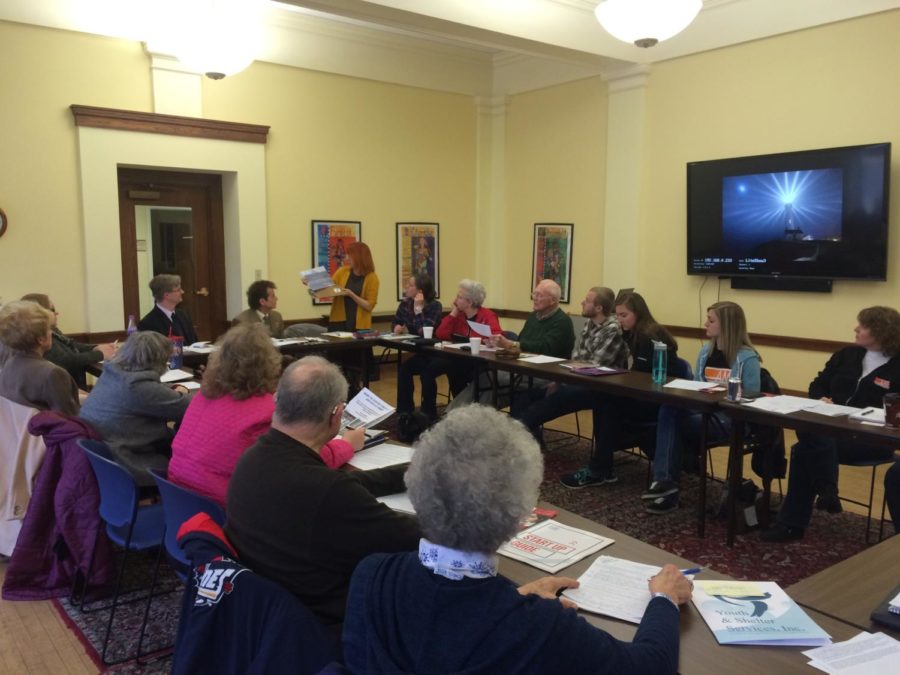Human trafficking roundtable addresses state’s lack of resources
The Central Iowa Network Against Human Trafficking met Friday, Jan. 23, at the Jacobson building to discuss how the group is going to address the issue of trafficking minority children in the midwest and create legislation that is human-trafficking sensitive.
November 4, 2015
The full extent as to how much human trafficking occurs, the victims it accumulates and the money it garners in Iowa is unknown. With the state lacking in resources and knowledge, hard facts and data is hard to come by.
Speaker Kraig Paulsen, R-Hiawatha, and Sen. Kevin Kinney, D-Oxford, met with leaders of human trafficking advocate organizations from around the state Wednesday to discuss what Iowa needs in order to better tackle the issue of modern day slavery. The meeting at the capital included an update on Iowa’s human trafficking legislation, as well as reports from representatives of the Iowa Attorney General’s Office and the Department of Public Safety.
Iowa Code chapter 710A defines human trafficking as “participating in a venture to recruit, harbor, transport, supply provisions or obtain a person… for forced labor that results in involuntary servitude, peonage, debt bondage or slavery or commercial sexual activity through the use of fraud or coercion,” unless the trafficked person is under the age of 18, when the presence of force, fraud or coercion is not needed for the situation to be considered trafficking.
Kinney, who served nearly 30 years as deputy for the Johnson County Sheriff’s Department before taking office, said he has “seen firsthand what this does to people.”
Representatives from the Legislative Services Agency shared background on Iowa’s human trafficking laws and updated the group on current legislation. Senate File 510 makes human trafficking a felony, a new feat.
The bill, signed by the governor in June, also adds to the victim compensation fund to “train participants to recognize and report incidents of human trafficking and to suppress the demand that fosters exploitation of persons and leads to human trafficking.”
A few suggestions provided to improve the way the state deals with trafficking included training law enforcement, prosecutors and legislators, increasing public awareness, allocating more funding into agencies to help victims and collect data, creating a statewide collaborative program and updating legislation to better prosecute buyers of commercial sex.
Training law enforcement was one of the main points of discussion. There are some obvious signals of trafficking victims, but some groups of people who could intervene don’t know them, making the chances of helping a victim zip to zero, said Roxann Ryan with the Department of Public Safety.
Curt Henderson of the Iowa State Patrol admitted he was once, “one of those officers who thought trafficking wasn’t a huge issue” and law enforcement hasn’t always been the most willing to get “on board,” when it comes to training or investigating into trafficking.
“I have come to believe law enforcement needs to become the lead [in combating trafficking],” Henderson said, but that no law enforcement agency in the state is “adequately staffed.”
Tom Ferguson with the Attorney General’s Office shared with the group information about a statewide program attempting to challenge the state’s prosecutors to focus on best practices of pre-trial, investigation and the actual trial, including how to best support the survivor during the process.
“Most prosecutors across the state aren’t as knowledgeable about human trafficking victims,” he said. “Who is at risk? What are the forms of it? Warning signs? Where are resources available?”
Teresa Downing-Matibag, director of the Iowa Network Against Human Trafficking and lecturer of sociology at Iowa State, shared an update of the network’s work, which included training foster care parents to recognize signs of trafficking in their youth and training hotel staff to look out for possible commercial sex acts in the building.
Downing-Matibag said, “We are at a tipping point in Iowa, where if we do not address this issue, there’s no turning back.”

















